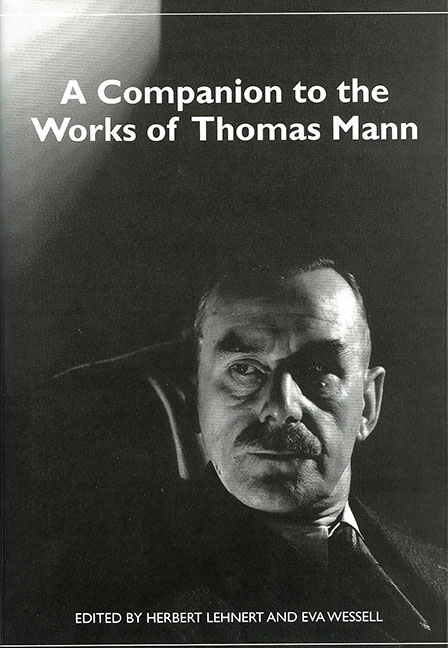Book contents
- Frontmatter
- Contents
- Foreword
- Thomas Mann's Works
- List of Abbreviations
- Introduction
- Thomas Mann's Beginnings and Buddenbrooks
- Art and Society in Thomas Mann's Early Novellas
- Love in Society: Thomas Mann's Early Stories
- “Death in Venice”
- “Mein ‘Friedrich’ — das ist was Anderes”: Thomas Mann's Unwritten Novel about Frederick the Great, King of Prussia
- Magic and Reflections: Thomas Mann's The Magic Mountain and His War Essays
- Thomas Mann's “Autobiographical” Stories
- Joseph and His Brothers
- Lotte in Weimar
- Thomas Mann's Late Politics
- “German” Music and German Catastrophe: A Re-Reading of Doktor Faustus
- The Gaze of Love, Longing, and Desire in Thomas Mann's “The Transposed Heads” and “The Black Swan”
- Felix Krull
- Female Identities and Autobiographical Impulses in Thomas Mann's Work
- Betrayed or Not Betrayed: A Testament?
- Thomas Mann's Comedies
- Notes on the Contributors
- Select Bibliography
- Index
Thomas Mann's “Autobiographical” Stories
Published online by Cambridge University Press: 28 April 2017
- Frontmatter
- Contents
- Foreword
- Thomas Mann's Works
- List of Abbreviations
- Introduction
- Thomas Mann's Beginnings and Buddenbrooks
- Art and Society in Thomas Mann's Early Novellas
- Love in Society: Thomas Mann's Early Stories
- “Death in Venice”
- “Mein ‘Friedrich’ — das ist was Anderes”: Thomas Mann's Unwritten Novel about Frederick the Great, King of Prussia
- Magic and Reflections: Thomas Mann's The Magic Mountain and His War Essays
- Thomas Mann's “Autobiographical” Stories
- Joseph and His Brothers
- Lotte in Weimar
- Thomas Mann's Late Politics
- “German” Music and German Catastrophe: A Re-Reading of Doktor Faustus
- The Gaze of Love, Longing, and Desire in Thomas Mann's “The Transposed Heads” and “The Black Swan”
- Felix Krull
- Female Identities and Autobiographical Impulses in Thomas Mann's Work
- Betrayed or Not Betrayed: A Testament?
- Thomas Mann's Comedies
- Notes on the Contributors
- Select Bibliography
- Index
Summary
All of it is autobiography.” Thomas Mann made this claim in the foreword to his late essay collection Altes und Neues (Old and New, 1953). It applies to all of his work. Yet it is significant that Mann never embarked upon a more extensive autobiography than he did in his two essays “Lebensabriss” (Sketch of my Life, 1930) and Die Entstehung des Doktor Faustus (The Story of a Novel: The Genesis of Doctor Faustus, 1949). In 1950, in the lecture “Meine Zeit” (My Time), he told us quite clearly why: “It is true, I have been asked occasionally to tell my life's story, to make one book out of the many for which I have used my life as rootstock. But, I have given in to such suggestions only occasionally by telling friends, or myself, of the origin of this or that piece of work. Perhaps, I don't love my life sufficiently to be an autobiographer” (Essays 6, 160, Mann's italics).
Why did Mann believe he was not suited to write autobiographies, when he had constantly used his life as material for his texts? He explained it in the same context, speaking of “his life” in the third person: “The production of a lifetime, from its beginning to the approaching end, had been the result of an anxious desire to make amends, of a craving for cleansing and justification” (Essays 11, 302). This wish is of an arch Protestant nature. In Thomas Mann's eyes his life needed justification. Mann was a person who carried with him the awareness, if subliminally, that his life was questionable and not progressing as it should. His was not an unchristian life, but it was flawed enough to burden him with the awareness that it might be wanting; insights like these might even have included feelings of sinfulness. If we take these sentences seriously, not only Mann's essayistic work but his entire oeuvre must be considered autobiographical in the sense that it seeks some form of justification. Mann never put any obstacles in the way of his readers, should they wish to discover in his works their author and his problems: his self, his experiences, and his problematic relationship with the world — and with himself.
Even though Mann consistently talked about himself in his works, he did not like to do so expressively.
- Type
- Chapter
- Information
- A Companion to the Works of Thomas Mann , pp. 147 - 158Publisher: Boydell & BrewerPrint publication year: 2004

